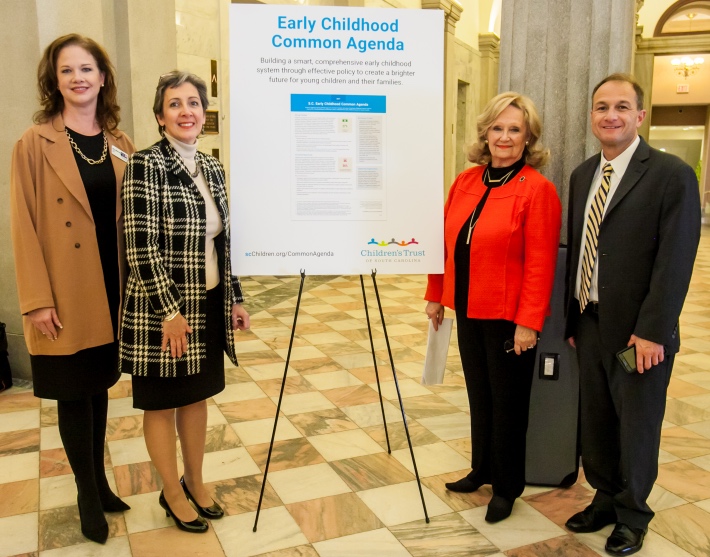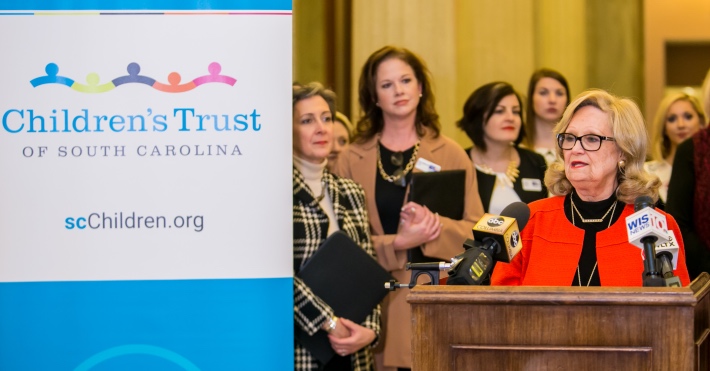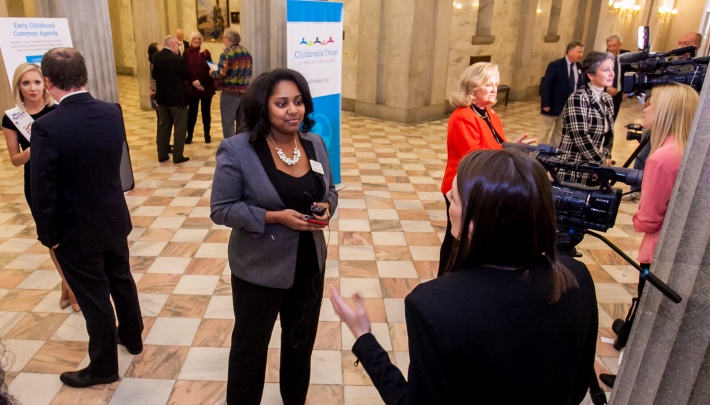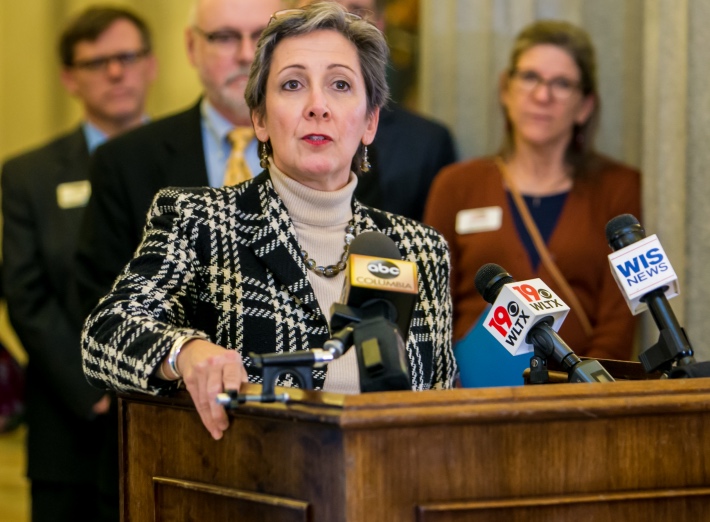The Early Childhood Common Agenda is a set of recommendations for lawmakers in the 2017 legislative session to improve opportunity for working families and children. These straightforward practices took center stage at the State House, where Children’s Trust, the Institute for Child Success, and the United Way Association of South Carolina held a press conference about building a smart, comprehensive early childhood system. Neil White, who tells the stories of Children’s Trust, covered the event.

United Way Association of S.C. CEO Kelly Callahan Cruise, Children’s Trust CEO Sue Williams, Rep. Rita Allison, and Institute for Child Success president Jamie Moon present the 2017 Early Childhood Common Agenda at the State House.
For three of South Carolina’s leading child advocacy organizations, there’s not much more important than the issues of early education for young children, access to affordable and quality child care, tax credits for working families, and home visiting programs that assist young mothers and their infants.
At the State House in early February, the 2017 Early Childhood Common Agenda (ECCA), which includes several specific policy recommendations for the General Assembly, was unveiled by Children’s Trust of South Carolina, the Institute for Child Success, and the United Way Association of South Carolina.
Children’s Trust CEO Sue Williams noted that South Carolina has moved up to its highest ranking of No. 41 nationally in child well-being as measured by the Annie E. Casey Foundation’s KIDS COUNT data. The improvement has occurred because organizations across the state are linking arms and working together to provide positive change for children and their families in the areas of health, education and economics.
“We see slow and steady progress for children and their families, especially where we are making investments in prevention and using proactive strategies that work to give children a great start in life,” Williams said. “It is time for us to build on that success. Regardless of where they were born or the color of their skin, we want all children to have every opportunity to thrive and become strong future citizens.”

Rep. Rita Allison, R-Spartanburg, discusses the recommendations of the ECCA from a lawmaker’s perspective.
Rep. Rita Allison, R-Spartanburg, saluted the work being done by the three organizations, especially as it related to the “good ideas” provided in the ECCA, which include a state Earned Income Tax Credit for working families, getting far more children enrolled in higher-quality Pre-K programs for 3- and 4-year-olds, and better, more affordable child care for struggling families.
“We can always debate the best way to solve some of our state’s most important challenges,” Allison said. “What matters most at the end of the day is that we all come together to find solutions. I know we can do that on some of these issues.”
Speakers at the press conference discussed the key elements of the ECCA, which included:
- New tax credits to help working families keep more of what they have earned to help cover expenses such as child care and transportation;
- Boosting capacity and incentives for child care providers to participate in the state’s Quality Rating and Improvement System (QRIS) that would help provide guidance for parents and incentives for providers to improve;
- Expanding voluntary home visiting programs to improve health and education for children from birth to age 5, while becoming a national model by using Pay for Success financing.

Whitney Tucker, Children’s Trust policy research associate, Rep. Rita Allison and Sue Williams do interviews with Columbia-area television stations.
Jamie Moon, the president of the Institute for Child Success (ICS), a nonprofit organization based in Greenville, stated the progress continues to be hindered by the negative effects of poverty. He’s convinced sensible solutions can be supported by leaders from all perspectives.
“Why is this work important? Because good people across the political spectrum agree with improving life for our state’s youngest children, especially disadvantaged children,” Moon said. “It strengthens our state’s economy. It improves our communities. There’s no doubt that high-quality programs make a difference in children’s lives.”
Kelly Callahan Cruise, CEO of the United Way Association of South Carolina, thanked all the partners around the state who helped provide input, expertise, and support for recommendations within the agenda, which has informed lawmakers annually since 2014 and served as a framework for new laws that benefit children and their families.
“We’ve already seen an increase in the training required for family-based child care providers,” Cruise said. “We’ve seen other steps to boost quality in child care centers that receive vouchers from low-income families. And we’ve seen the publication of the state’s first study of child care availability and quality. So we know where we stand.”

Williams addresses the media on the importance of the ECCA in helping South Carolina’s families and children.
Williams points to the recommendations in this year’s agenda as incremental steps that can make a positive difference for families and help alleviate disadvantages that too many of them face.
“If families have better access to quality and affordable early care and education, then children will be better prepared for school. We set them up for future success, and all of us will feel that impact,” Williams said. “Our work today on behalf of children and their families lays a strong foundation for South Carolina’s future prosperity.”




